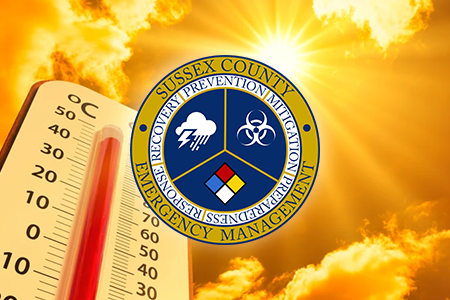
1 p.m. Monday, June 23, 2025: Barely hours after the solstice, and the first official heat wave of the year is setting up to scorch Sussex County and much of the East Coast with sizzling temperatures and oppressive humidity to usher in Summer 2025.
To help the public beat the heat, County officials on Monday announced that several facilities are designated as ‘cooling stations’ through Wednesday, June 25, as National Weather Service forecasters predict temperatures to soar into the mid- and upper 90s during that period. An extreme heat warning is in effect for Sussex County until 8 p.m. Wednesday, June 25. Possible showers and thunderstorms later in the week could bring some relief, sending temperatures back to the upper 80s by next weekend.
In anticipation of the hot weather, Sussex County reminds the public that select County facilities, as well as partner locations at 11 independent community libraries, are always available as cooling stations in the summer during their regular business hours, offering the public a respite from the heat and humidity. The air-conditioned County sites include:
|
County Admin Building |
Greenwood Library |
|
Milton Library |
South Coastal Library |
Sussex County paramedics will make routine stops at the County facilities, as time permits, during the anticipated heat wave to answer any heat-related questions and/or concerns. Also, free, individual servings of bottled water will be available during this period to help the public cool off from the extreme conditions. When visiting a relief station, please bring any needed medications and/or specialty items.
For a map of designated ‘cooling stations’ in Sussex County, visit https://tinyurl.com/bde2v3mv.
Residents and visitors are urged to limit exposure outside, particularly during the hottest part of the day – roughly from 1 p.m. until 6 p.m. Those who must be outside should take frequent breaks, and drink plenty of water.
Here are some hot weather safety tips:
- Wear lightweight and light-colored clothing. Lighter clothing deflects sunlight, and will not absorb heat like dark materials do;
- Stay in properly ventilated areas;
- Avoid strenuous activity during the hottest part of the day;
- Have plenty of water available. Avoid alcoholic beverages;
- Be aware of the signs of heat cramps, heat exhaustion or heat stroke, and seek medical attention if necessary. Signs of heat cramps can include muscular pains and spasms from heavy exertion. Resting in a cooler area, taking occasional sips of water and stretching the muscle mildly can counter the effects of heat cramps. Heat exhaustion and heat stroke are much more serious, and may require immediate medical attention. Symptoms of heat exhaustion can include a pale or flushed appearance, as well as headache and nausea. Heat stroke symptoms include rapidly increased body temperature, loss of consciousness, rapid or weak pulse and rapid, shallow breathing.
Be sure to check on friends, relatives and neighbors, particularly the elderly and young children, who may be at risk for exposure to the heat. Remember to give pets extra water, provide shade or bring them into a residence where temperatures are cooler.
It is also important to keep in mind that due to the higher temperatures and humidity expected in the area over the coming days, demand for electricity will increase. In an effort to reduce costs and avoid power shortages, Sussex County Emergency Management asks all residents and business operators in Sussex County to help conserve power to avoid outages.
You can help in the conservation of electricity by taking the following steps:
- Set air conditioners to 80 degrees, or use fans instead, and minimize the opening of refrigerators and freezers;
- Limit the use of electric water heaters and turn off non-essential appliances and lights;
- Delay using high-energy appliances, such as washing machines and dryers, until after 8 p.m.;
- Prepare light summer meals that require minimal, if any, cooking. Try using an outdoor grill or microwave oven instead of an electric range;
- Keep window shades, blinds, or drapes closed to block the sunlight during the hottest portion of the day;
- Move lamps, TVs and other heat sources away from air conditioner thermostats. Heat from those appliances is sensed by the thermostat and could cause an air conditioner to run longer than necessary;
- Move furniture and other obstacles from in front of central air conditioning ducts to allow cooler air to circulate through rooms more freely.
